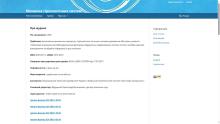The collection of scientific and technical works "Mechanics of gyroscopic systems" publishes content articles related to the latest results of theoretical studies on navigation and orientation, solids management, the analysis of gyroscopic errors in conditions of vibration and overload, an assessment of the efficiency of increasing the accuracy of devices by various methods. The articles are prepared by leading scientists of Ukraine and beginner scientists.
The articles in the collection are devoted to the coverage of dynamic processes in gyroscopic and other object control systems, conditions of their stabilization under various destabilizing excitation factors, information systems, systems and means of navigation, measurement and information processing in these systems.
Founder: National Technical University of Ukraine “Igor Sikorsky Kyiv Polytechnic Institute”
The collection has been published since 1983 by the Faculty of Aviation and Space Systems of the National Technical University of Ukraine “Kyiv Polytechnic Institute”.

